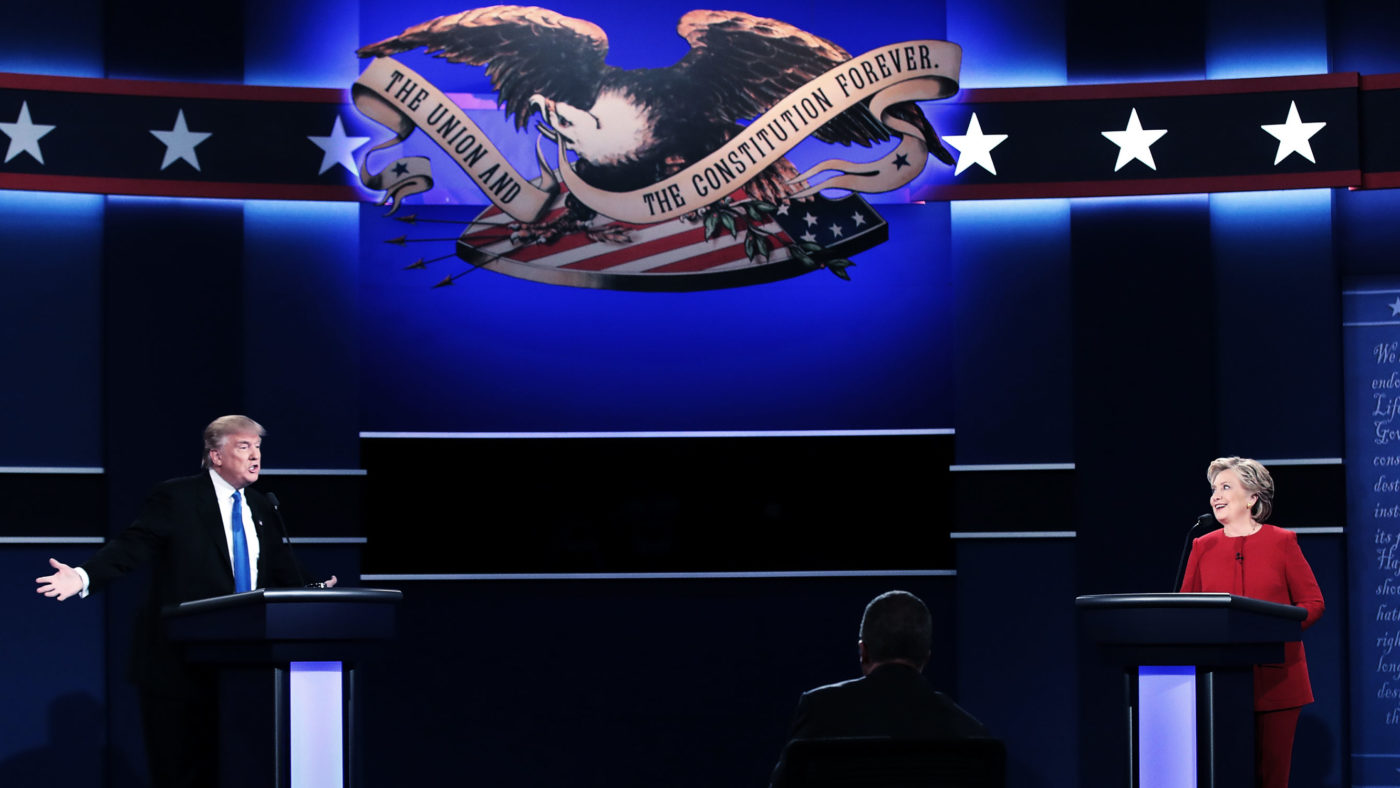Presidential debates are not as significant as the hype would have you believe. From Richard Nixon’s sweating in the first televised debate exactly 56 years ago, to Al Gore’s patronising sighs in 2000, the popular narrative suggests that these moments decide elections. Yet the evidence suggests that even those infamous examples failed to shift opinion significantly.
Nevertheless, thousands of journalists hang on every word like it’s a boxing match, looking for that “knockout blow”. Last night in Long Island, in the highly anticipated debate between Secretary Clinton and Donald Trump, plenty of “blows” were landed. Arguably Clinton landed more, with Trump “on the ropes” at several points. In many ways, though, how the narrative is spun is more important than the debate itself.
If you tuned in last night to find out more about November’s result, you’re likely to have been disappointed. What did make the debate significant, though, was the confrontation of ideas. For the first time in the general election campaign, two radically different directions for America were pitted against each other on stage.
Among all the noise about tax returns and email controversies, we heard arguments from two very different political ideologies. These were not subtle disputes over policy but clashes between fundamentally divergent visions for America. Clinton’s carefully thought out plan collided with Trump’s populist rhetoric, and the results were clear.
Split into three sections, the debate – hosted by NBC veteran Lester Holt – looked at America’s economic future, racial tension and security, and foreign policy.
On economic policy, the distance between the candidates is stark.
Trump highlighted his usual scapegoat for economic failure, and the issue at the core of his campaign: trade.
Regardless of the businesses and jobs sustained by Mexican trade and labour, Trump talked about the US “losing our jobs” to Mexico. China, he added, are “beating us”, while he called NAFTA the worst trade deal ever: pointedly referring to the swing states of Ohio and Pennsylvania, where “you will find devastation”. Meanwhile, in an attempt to woo Reaganites and fiscal conservatives, he announced his plan to cut income tax from 35% to 15%: “I’m gonna cut tax big league”.
For Clinton, on the other hand, people like Trump epitomise the problem. She spoke of the failure of “Trumped up, trickle down” economics which had failed working people, including the nine million who had lost their jobs since the financial crisis. She promised more regulation and progressive taxes to promote “broad-based inclusive growth” – contrasting to Trump’s low-tax, lightly regulated economy.
She was buttressed on this point by Trump’s apparent admission that he had smartly avoided paying federal tax, and allegedly avoided paying some members of staff. Perhaps the best illustration of the gulf between them came when she criticised his 2006 comments – that he “sort of hoped” markets tanked because of the opportunities it would create – and he replied: “That’s called business, by the way.”
Next up was the question of race and security in America. It was here that the significant shortcomings of Trump’s plans really became evident.
Asked about racial tension in US society, Hillary Clinton spoke about the deep-rooted nature of the problem. She referred to “systematic racism in our criminal justice system”, the problems with mandatory minimum sentences, and having to work with communities to deal with implicit bias.
With American prison populations vastly dwarfing those of other developed countries, and dominated by young black men, one cannot ignore the depth and racial nature of the problem. Clinton spoke of the importance of community work, as well as pointing out the need for common-sense gun safety measures: “If you’re too dangerous to fly, you’re too dangerous to buy a gun.”
Trump’s top-down “law and order” approach is radically different. Indeed, he often seemed to be “whitesplaining” – effectively ignoring the racial aspect of the issue, and simply discussing the need for being more vigilant in tackling criminal gangs. Bizarrely, he kept referring to the fact that he has investments in Charlottesville and Chicago, as if that gave him some insight into the problems there.
Finally, the the debate turned to foreign policy, on which Clinton’s detailed and measured performance was again at odds with Trump’s off-the-cuff, and rather alarming, approach.
In the final half-hour, indeed, he came properly unstuck, as both his temperament and foreign policy plans were found wanting. He was finally challenged on his suggestion that he was always against the Iraq war. Trump suggested China should “go into North Korea” to sort out the problem there, and even implied that the US shouldn’t bother spending money to help defend Japan.
Clinton took full advantage, pointing out that “words matter when you run for president”, and giving reassurance to leaders across the globe that America will honour its alliances, not least those embodied by Article 5 of the Nato treaty. She also rebuked Trump’s ugly exclusion of Muslims during his campaign, reminded the audience of her role in killing Osama Bin Laden, and repeated her phrase: “a man who can be provoked by a tweet should not have his fingers anywhere near the nuclear codes”. She looked, in other words, like a commander-in-chief at the ready.
While the debate will not decide November’s election, it gave further insights into the biggest differences between the candidates. Trump has gained support among swathes of the population by telling them that the economy – and their lives – are bad and getting worse. Clinton is trying to persuade them that even if that’s true, he’s the worst possible man to fix it.


